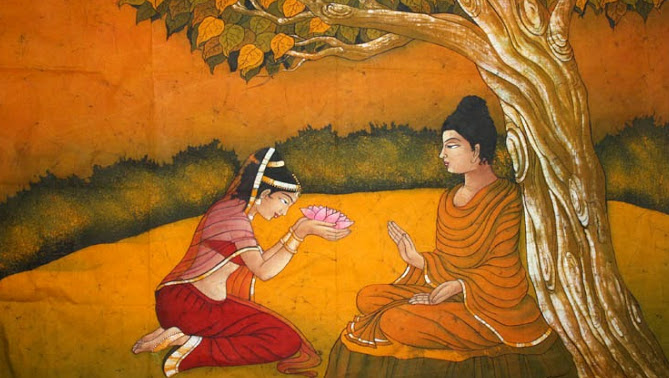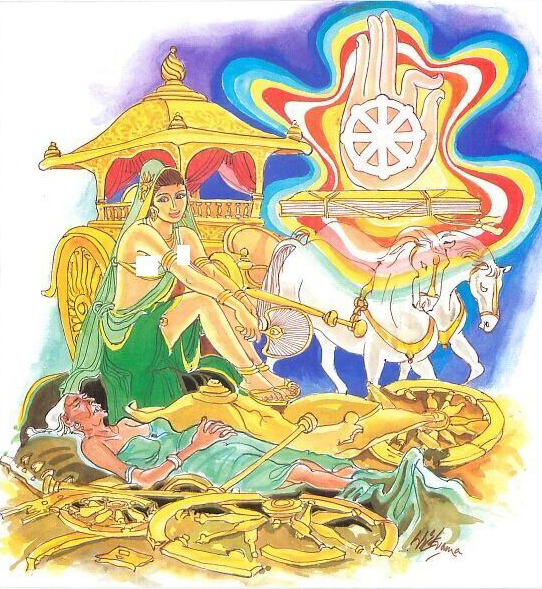
Verse 150: This body (lit., the city) is built up with bones which are covered with flesh and blood; within this dwell (lit., are deposited) decay and death, pride and detraction (of others’ virtues and reputation).
The Story of Theri Rupananda (Janapadakalyani)
While residing at the Jetavana monastery, the Buddha uttered Verse (150) of this book, with reference to Janapadakalyani.
Princess Janapadakalyani was the daughter of Gotami, the step-mother of Gotama the Buddha; because she was very beautiful she was also known as Rupananda. She was married to Nanda, a cousin of the Buddha. One day she pondered, “My elder brother who could have become a Universal Monarch has renounced the world to become a bhikkhu; he is now a Buddha. Rahula, the son of my elder brother, and my own husband Prince Nanda have also become bhikkhus. My mother Gotami has also become a bhikkhuni, and I am all alone here!” So saying, she went to the monastery of some bhikkhunis and became a bhikkhuni herself. Thus, she had become a bhikkhuni not out of faith but only in imitation of others and because she felt lonely.
Rupananda had heard from others that the Buddha often taught about the impermanence, unsatisfactoriness and insubstantiality of the khandhas. So she thought he would talk deprecatingly about her good looks if he should see her; and thus thinking, she kept away from the Buddha. But other bhikkhunis coming back from the monastery, kept talking in praise of the Buddha; so, one day, she decided to accompany other bhikkhunis to the monastery.
The Buddha saw her and reflected, “A thorn can only be taken out with a thorn; Rupananda being very attached to her body and being very proud of her beauty, I must take the pride and attachment out of her through beauty.” So, with his supernormal power, he caused an image of a very beautiful lady of about sixteen years of age to be seated near him, fanning him. This young girl was visible only to Rupananda and the Buddha. When Rupananda saw the girl, she realized that compared to that girl, she herself was just like an old, ugly crow compared to a beautiful white swan. Rupananda had a good look at the girl and she felt that she liked her very much. Then, she looked again and was surprised to find that the girl had grown to the age of about twenty. Again and again, she looked at the figure beside the Buddha and every time she noticed that the girl had grown older and older. Thus, the girl turned into a grown-up lady, then into a middle-aged lady, an old lady, a decrepit and a very old lady successively. Rupananda also noticed that with the arising of a new image, the old image disappeared, and she came to realize that there was a continuous process of change and decay in the body. With the coming of this realization, her attachment to the body diminished. Meanwhile, the figure near the Buddha had turned into an old, decrepit lady, who could no longer control her bodily functions, and was rolling in her own excreta. Finally, she died, her body got bloated, pus and maggots came out of the nine openings and crows and vultures were trying to snatch at the dead body. Continue reading →


















